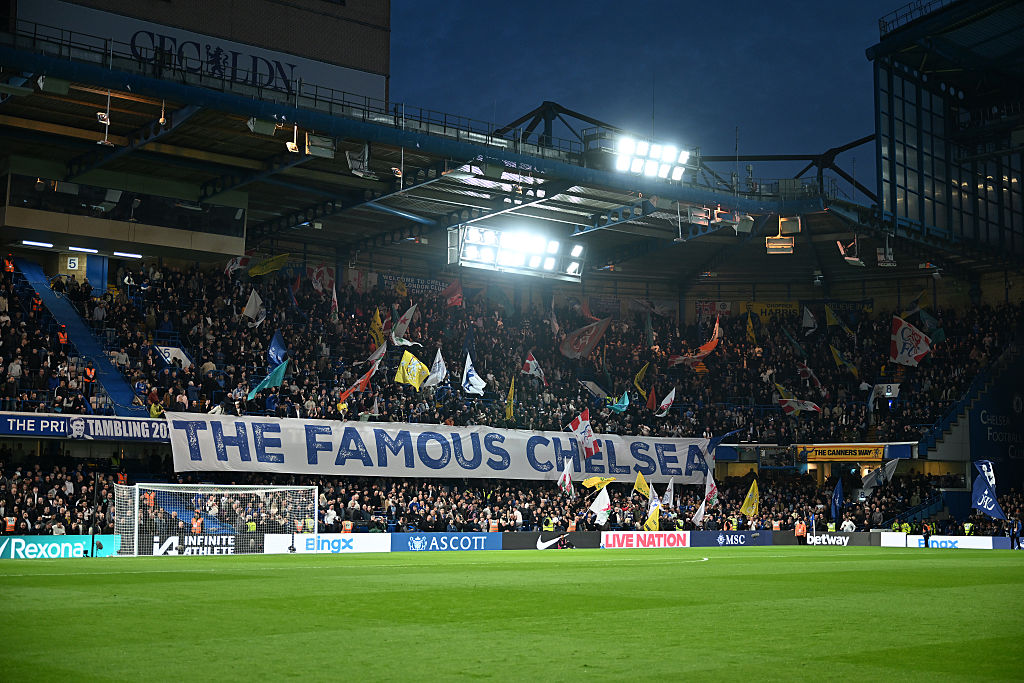What’s it like to scout for Football Manager? A Sports Interactive expert reveals all
It’s the game with a database so vast and well-researched that even the pros have taken to consulting it for reference (and sometimes even more than that). FFT’s Joe Brewin asks FM research assistant Stephen Davidson how it’s done
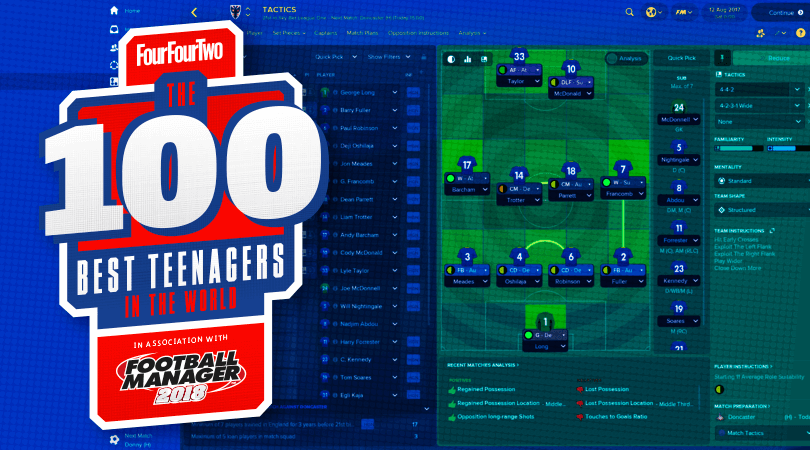
Hi Stephen, thanks for chatting. FM 2018 has got over 2,500 playable clubs, which makes our eyes water. How the ruddy hell do you make sure all of their players are present, accounted for… and most of all accurate?
The basic system relies on a network of scouts around the world. You have six researchers, and below that there are 100 head researches – those guys are responsible for focusing on a nation or a league. Below them, there are around 1,000 assistant researchers; a more fluid number because they come and go – and their job is look at one or two clubs.
For example, although I’m at the top of the pyramid because I work entirely as a researcher, I do their job also by looking at my club Yeovil Town. In doing that my job is to watch the team as much as I can, including the youth teams, to help build that knowledge on the team. I’m following the club like all those people who are obsessed with their own – and the beauty of that is that these kinds of fans are well-informed. We try to harness that by using this dedication for research.
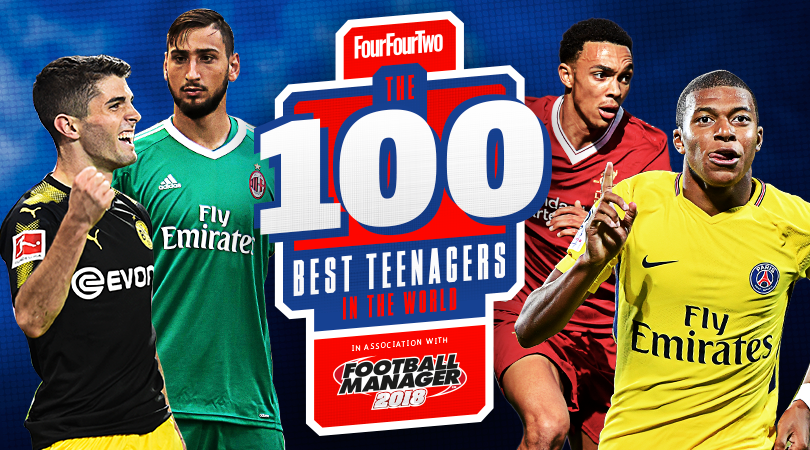
If Yeovil sign a new player, I’ll update his contract and then try to find out about the player by using the internet and other club’s forums. I’ll then look at the player’s profile to make sure everything is up to date. For example, if he had a loan spell at Lowestoft Town and had two appearances missing, I’ll update that and add that to his profile. Ultimately, we just want an accurate representation of the player.
We have two or three phases per year where we go to the assistant researchers to update what’s been compiled on the clubs and players. For example, near release day or the transfer update, we go up the pyramid to head researchers who look at all the clubs in a nation and make sure everything is alright. Has a researcher got too giddy and overrated their club and its players? The next job is to assess the clubs – for example, how Yeovil fit within their league.
Once a head researcher is happy with how his nation looks in terms of players and teams, there are the finer details to consider: aspects like weather and tax systems. Then they pass that information on to us. We look even further into things such as how those leagues fit into the world spectrum and how each nation fares against each other on that scale.
Basically, it’s a gradual process. We aren’t saying it’s definitive and that everything we say is correct; we just watch and observe things, record and log them. If something is incorrect, it can be fixed. If we see a player who’s rated as a potential Premier League-quality winger and it turns out he isn’t performing on the pitch, we can adjust his attributes to fit reality.
The best features, fun and footballing quizzes, straight to your inbox every week.
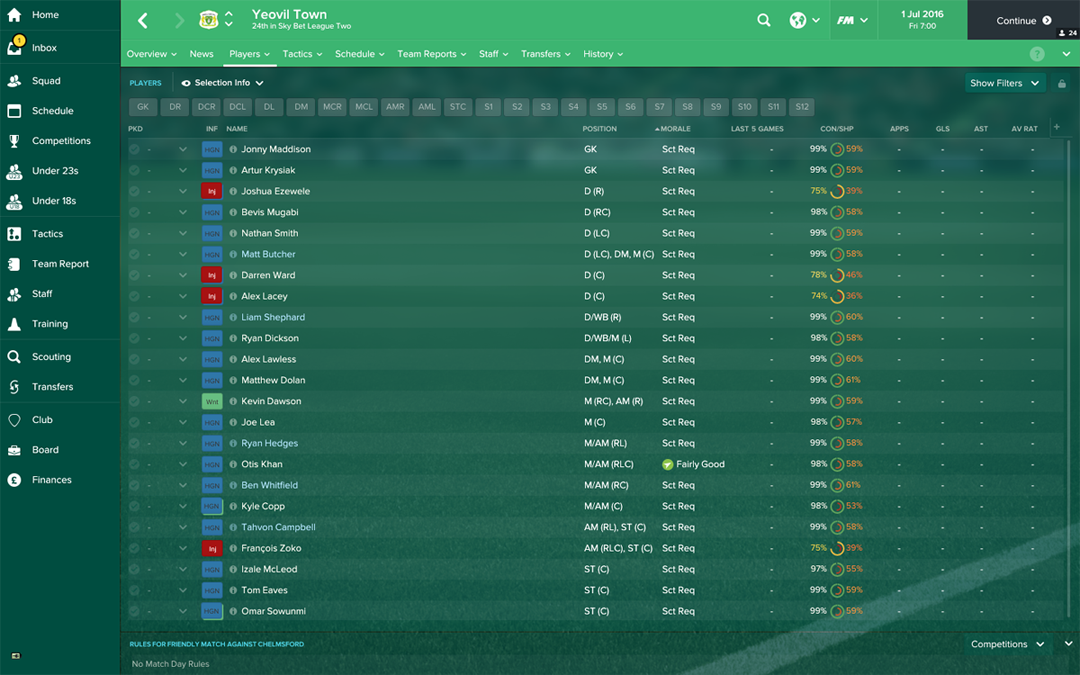
You must have some ludicrously obscure knowledge rattling around...
You get to the point where you see everything as being important, yes. As someone who played the game before I worked on it, everything matters. If there’s a 17-year-old-youth product at Boreham Wood and his name is spelt incorrectly, that bothers me – it should be as as important as having Wayne Rooney’s England appearance record correct.
I’m following the club like all those people who are obsessed with their own – and the beauty of that is that these kinds of fans are well-informed. We try to harness that
In FM 2017 you had to build the Gibraltarian league from scratch, for example. How did that process work?
We realised we had no knowledge on the league in the office, so I went away and swotted up on some basics. It turned out some little bits were already in the database through previous acknowledgements of players’ career paths.
Then we went about adding to clubs, speaking to people and making a bunch of contacts, then building a base of people who played the game from Gibraltar and posted on our forum. Through them we reached some others higher up the pyramid, and that’s where we managed to build up the more detailed knowledge.
At the time our head researcher on the ground in Gibraltar was a guy called Julian Fortuna, who actually played in goal in the Premier Division in Gibraltar. He gave us lots of information – and continues to – and so did his friends. It was around the time when Gibraltar ended up being recognised by the governing bodies, which made it a good time to introduce their clubs into the game. We worked with the Gibraltar FA and managed to get a licence with them where we could produce official kits and badges for the league, and get more official information on the players too.
Time to get back to my game on Storming the February 27, 2015
As you can tell, it’s a process of picking up little pieces each day; come the end of the year we had a big pile of information. We’re still refining the process and are always taking on new researchers – quite often they’re those just playing the game. They report bugs or things we’ve got wrong to us on the forum, and after a while I see them being interested in making the league look better and helping out even more. That’s how the consumers become collaborators.
Gibraltar is a tiny place – they have one pitch for the two leagues to play on for men’s football. They have a reserve league and a women’s league, whose teams also play on that one pitch. I get sent the timetable of the league for the year and it really is a thing of wonder. The whole thing is a potted representation of what Football Manager is on a much bigger scale.
There’s a big element of trust with your researchers then, isn’t there? Even you, the overlords, can’t police their exuberance perfectly...
To an extent we have to trust people, but because we have a system of checks and balances of the data that’s flying back and forward, the balance is pretty good. You also know there are millions of eyes on this game constantly, so if somebody’s overrated or if something is wrong then people aren’t afraid to call it out.
Our researchers tend to be those who’ve reported issues or had similar conversations with us, and then ended up being asked to do the jobs or volunteer their time and skills. You can’t get away with much: if you look on our forums you can see how upset people get and how much they care about this stuff, so it means everyone’s doing their best work and trying really hard not to get things to wrong.
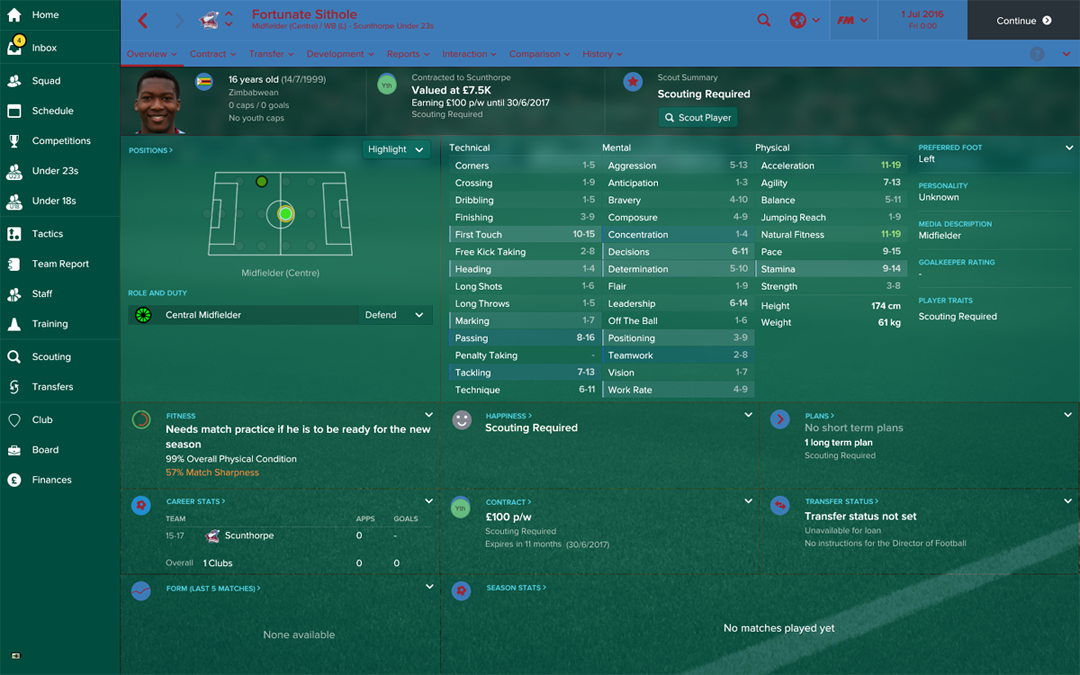
Is every player on the game watched by somebody?
That’s the hope, but if they haven’t been watched then the aim is that they would be soon. Sometimes you’ll hear about a player who’s signed having never heard of them – maybe they’ve been on trial somewhere or played in a country one of our researchers hasn’t had the chance to watch a game in.
You can have that very particular kind of researcher frustration; of looking at a profile that’s not really filled in. It’s kind of a balancing technique – and we have a code where if the player has no attributes, the game can create a profile for them based on the information you have. What position do they play in? How old are they? Where did they play their youth football? At what level? So you can start to say, ‘Well he’s not being picked for the first XI, and not even making the subs' bench, so that probably puts him in a certain bracket’. Is he not fit? Is he actually very talented and just needs some development? We can try to model all of this.
I’m not going to say every player in the database has been seen, but the aim would be that if they’re involved with football at a level that we scout, we’d want to see them to provide the most complete profile we can.
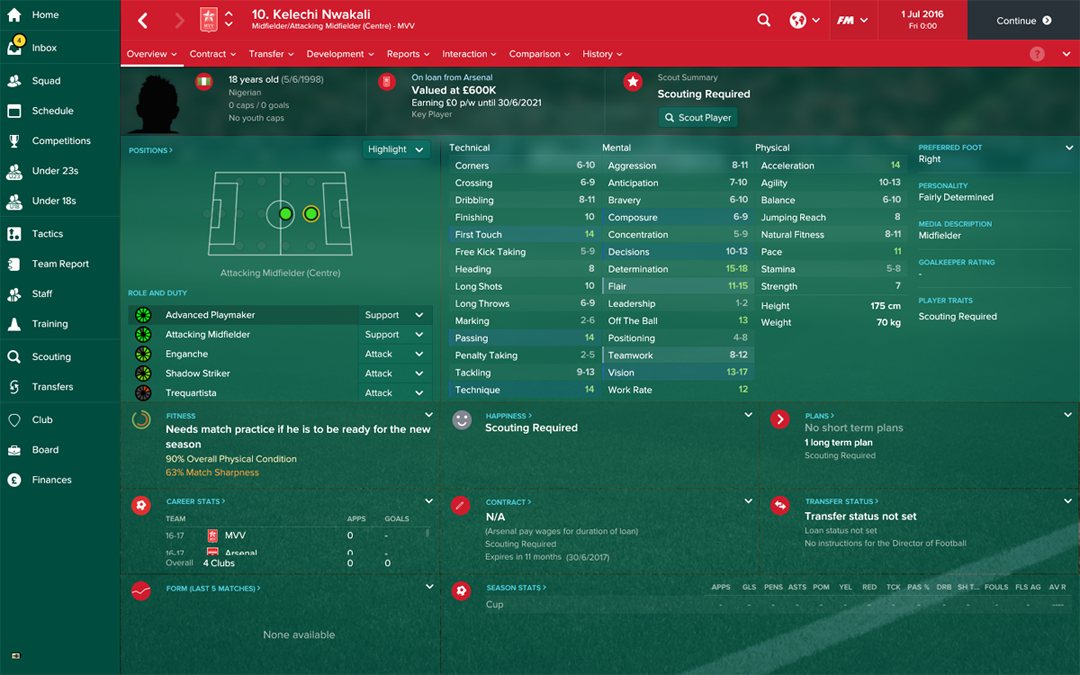
Do you actually play the game regularly?
Yep, and I still find it odd that I’ll be at work and have the game on my screen. I’m 31 now and a lot of people my age are at the point in their lives where they have a wife and kids, so can’t shut the door and play until the sun comes up.
When there’s things to be done there’s a danger I am so close to playing it too much, but I still love it – it can absorb you. Once or twice a year I’ll be playing the game and look around thinking ‘This is great’. It really is such a cool game, and you still find that excitement.
You can’t get away with much: if you look on our forums you can see how upset people get and how much they care about this stuff, so it means everyone’s doing their best work
One last question, then. What are your favourite Football Manager stories that have translated to real life?
Yeovil have got limited resources, of course, and a few years ago Terry Skiverton was in charge groaning about the lack of scouts and finances. So he put a call out at a press conference asking for player recommendations via Twitter.
At the time, someone who you could pick up on Football Manager for free but wouldn’t necessarily do very well was Kieran Agard, who is obviously much more of a household name now. At the time he still hadn’t found his feet and was kind of stop-starting, but Yeovil went in after a couple of people had recommended him from playing the game. I’m sure Terry Skiverton was doing proper scouting, but I thought it was great.
More recently, our Barnet researcher noticed on one of the player’s social media posts that he had Guyanese heritage. He looked at his profile and there was nothing there, so the data for Football Manager was input. Anyway, we told Guyana's FA about it and they called him up. He made his debut and scored… as a goalkeeper!
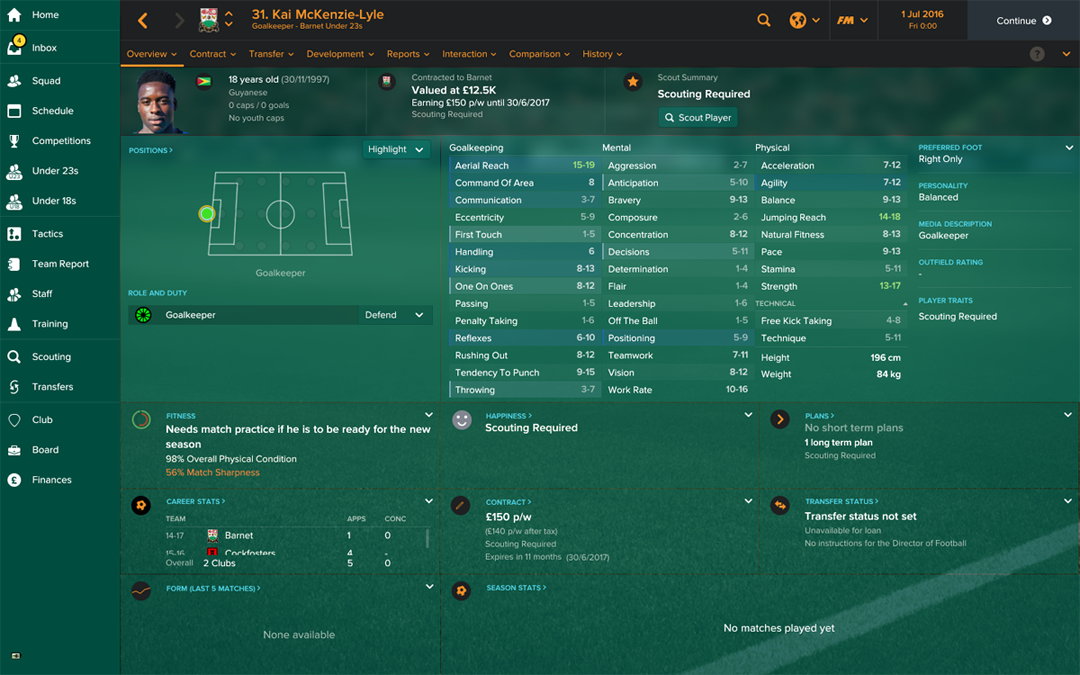
The whole thing was just bizarre. Obviously it was shared throughout the research department while we were all super busy freaking out about the new release, but I guess they’re the stories that make you smile most.
Get the list:
FourFourTwo’s 100 Best Teenagers in the World 2017
Joe was the Deputy Editor at FourFourTwo until 2022, having risen through the FFT academy and been on the brand since 2013 in various capacities.
By weekend and frustrating midweek night he is a Leicester City fan, and in 2020 co-wrote the autobiography of former Foxes winger Matt Piper – subsequently listed for both the Telegraph and William Hill Sports Book of the Year awards.
 Join The Club
Join The Club






